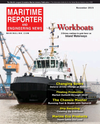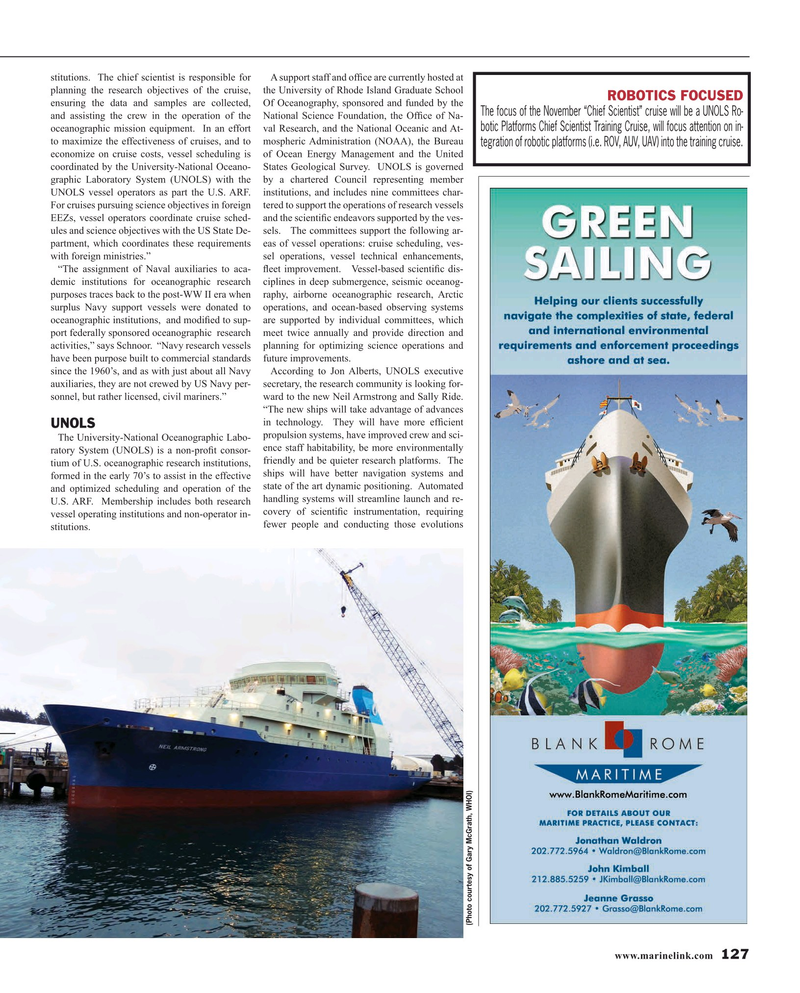
Page 127: of Maritime Reporter Magazine (November 2015)
Workboat Edition
Read this page in Pdf, Flash or Html5 edition of November 2015 Maritime Reporter Magazine
stitutions. The chief scientist is responsible for A support staff and of? ce are currently hosted at planning the research objectives of the cruise, the University of Rhode Island Graduate School
ROBOTICS FOCUSED ensuring the data and samples are collected, Of Oceanography, sponsored and funded by the
The focus of the November “Chief Scientist” cruise will be a UNOLS Ro- and assisting the crew in the operation of the National Science Foundation, the Of? ce of Na- botic Platforms Chief Scientist Training Cruise, will focus attention on in- oceanographic mission equipment. In an effort val Research, and the National Oceanic and At- to maximize the effectiveness of cruises, and to mospheric Administration (NOAA), the Bureau tegration of robotic platforms (i.e. ROV, AUV, UAV) into the training cruise. economize on cruise costs, vessel scheduling is of Ocean Energy Management and the United coordinated by the University-National Oceano- States Geological Survey. UNOLS is governed graphic Laboratory System (UNOLS) with the by a chartered Council representing member
UNOLS vessel operators as part the U.S. ARF. institutions, and includes nine committees char-
For cruises pursuing science objectives in foreign tered to support the operations of research vessels
EEZs, vessel operators coordinate cruise sched- and the scienti? c endeavors supported by the ves- ules and science objectives with the US State De- sels. The committees support the following ar- partment, which coordinates these requirements eas of vessel operations: cruise scheduling, ves- with foreign ministries.” sel operations, vessel technical enhancements, “The assignment of Naval auxiliaries to aca- ? eet improvement. Vessel-based scienti? c dis- demic institutions for oceanographic research ciplines in deep submergence, seismic oceanog- purposes traces back to the post-WW II era when raphy, airborne oceanographic research, Arctic surplus Navy support vessels were donated to operations, and ocean-based observing systems oceanographic institutions, and modi? ed to sup- are supported by individual committees, which port federally sponsored oceanographic research meet twice annually and provide direction and activities,” says Schnoor. “Navy research vessels planning for optimizing science operations and have been purpose built to commercial standards future improvements. since the 1960’s, and as with just about all Navy According to Jon Alberts, UNOLS executive auxiliaries, they are not crewed by US Navy per- secretary, the research community is looking for- sonnel, but rather licensed, civil mariners.” ward to the new Neil Armstrong and Sally Ride. “The new ships will take advantage of advances in technology. They will have more ef? cient
UNOLS propulsion systems, have improved crew and sci-
The University-National Oceanographic Labo- ence staff habitability, be more environmentally ratory System (UNOLS) is a non-pro? t consor- tium of U.S. oceanographic research institutions, friendly and be quieter research platforms. The formed in the early 70’s to assist in the effective ships will have better navigation systems and and optimized scheduling and operation of the state of the art dynamic positioning. Automated
U.S. ARF. Membership includes both research handling systems will streamline launch and re- covery of scienti? c instrumentation, requiring vessel operating institutions and non-operator in- fewer people and conducting those evolutions stitutions. (Photo courtesy of Gary McGrath, WHOI) www.marinelink.com 127
MR #11 (122-129).indd 127 11/3/2015 10:32:20 AM

 126
126

 128
128
